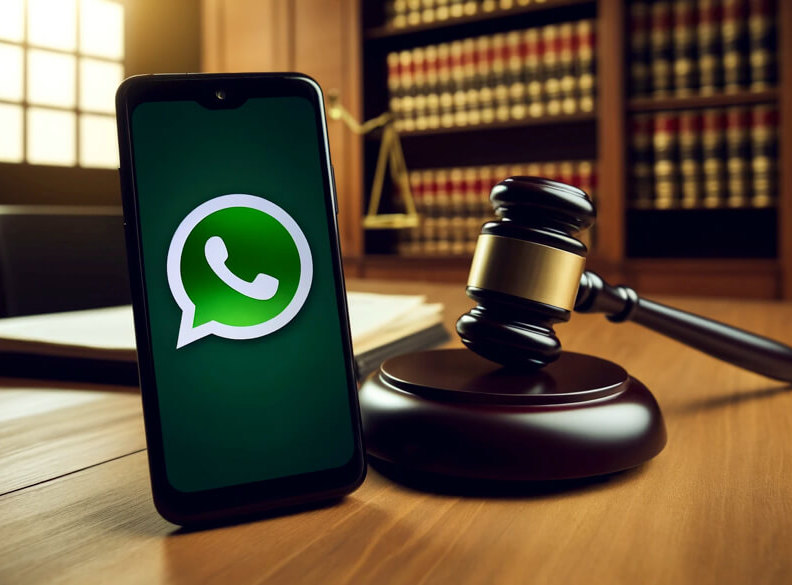May 22, 2024
📰 FEATURE STORY
Is the government right in its demands from WhatsApp?

As millions of Indians head to the polls, many will use WhatsApp for information. The 2019 elections were dubbed by some as the “WhatsApp elections”. Political parties and candidates have realised the power of the messaging platform. However, the company, owned by Meta, has threatened to leave the country over adherence to the government’s IT rules.
The company recently stated in the Delhi High Court that if it’s asked to break the end-to-end encryption for messages, it would have no choice but to cease its operations in India. The issue has sparked a discussion on the fine line between the right to privacy and the government’s task to ensure national security. Who’s in the right?
Context
WhatsApp threatening to leave India is a big deal. India is the largest market for the messaging platform, with over 400 million active users. The reason why it’s so popular is that it reaches people other platforms don’t, including and especially remote communities.
What’s interesting is WhatsApp is one of the BJP’s secret weapons in promoting its messaging come election season. It has grown a vast network of WhatsApp groups to help influence voters. Some estimates state that the party has over 50 lakh WhatsApp groups as part of its social media strategy.
That could be threatened if the government and WhatsApp can’t resolve the IT Rules issue. Information Technology (Intermediary Guidelines and Digital Media Ethics Code) Rules were introduced to regulate social media companies and platforms. Countries are grappling with this issue and wondering how to keep up with these ever-evolving platforms.
In the case of WhatsApp, the contention is about Rule 4(2). It states social media companies engaged in messaging services should reveal a sender’s identity if they’re ordered to by a court or competent authority. That person’s identity is called the first originator – the person who first sent the message.
WhatsApp didn’t like this rule and wants it deemed unconstitutional and said there shouldn’t be criminal liability in case of non-compliance. The company’s core argument is people use WhatsApp because of end-to-end encryption that guarantees privacy. This means that messages, photos, and videos are encrypted and can only be deciphered by the device that’s intended to receive them. No one or anything else in between has access.
The government is standing its ground and said the IT Rules have been made clear to social media companies, and there’s more than enough leeway for them to operate. Are they right?
VIEW: It should be a dealbreaker
WhatsApp is important for India and vice-versa. The company sees India as its biggest bet to make money for the platform. That’s evident through its different features, especially allowing payments through the platform. All of this rests on a fundamental principle – privacy through end-to-end encryption. The company doesn’t store messages or transaction logs. Even undelivered ones are deleted from the server after 30 days.
The company already has a framework in place if they’re asked for information related to a criminal inquiry. In its FAQ page, the company states that account records are preserved in connection with any official criminal investigations. The issue of traceability is complicated. While there are legitimate concerns about misinformation being circulated among thousands, if not millions, mandating traceability could be seen as a soft form of government surveillance.
If WhatsApp is supposed to comply, it would need to have massive databases of every message sent or add a permanent ID stamp to private messages to friends and family. The company contends that such rules don’t exist anywhere else, including Brazil, the platform’s second-largest market. If WhatsApp is mandated to comply with the traceability rule, then the floodgates would be opened.
COUNTERVIEW: Security takes precedence
Some argue that end-to-end encryption can’t be a blanket option. There must be exceptions in cases involving misinformation, deepfakes, child abuse content, or anything else that might cause social disharmony or affect election integrity. From the government’s point of view, no right is absolute, and there are to be reasonable restrictions. The guidelines on the first originator of information is one example.
That being said, one could argue that the rule isn’t too strict since there are a couple of caveats. The information will be only asked for in cases related to national security and sexually explicit material, including child pornography. Also, if there’s a less intrusive way than the one being prescribed, the rule won’t apply.
The government is standing its ground. None of the rules would affect the company’s normal functioning. The same for the users. The government also pointed out that WhatsApp itself would share user data with its parent company Facebook, for marketing and advertising. Ultimately, while this might seem uncomfortable, governments are within their rights to seek information for law enforcement. A global business should know that they need to adapt to local conditions.
Reference Links:
- Explained: Why WhatsApp Has Warned Of Platform’s End In India – NDTV
- Inside the BJP’s WhatsApp machine – Rest of the World
- WhatsApp used for its encryption, will have to break it to implement IT rules, parent company tells HC – The Indian Express
- WhatsApp gives India an ultimatum on encryption – Rest of the World
- WhatsApp shutdown threat in India: 4 Reasons government says WhatsApp needs to follow IT Rules – Times of India
- Centre accuses WhatsApp of attempt to stall norms – The Hindu
What is your opinion on this?
(Only subscribers can participate in polls)
a) The government is wrong in its demands from WhatsApp.
b) The government is correct in its demands from WhatsApp.
🕵️ BEYOND ECHO CHAMBERS
For the Right:
RSS-BJP separation is official now. It’s been a long time coming under Modi decade
For the Left:
Mamata Banerjee is checking the way the wind blows

